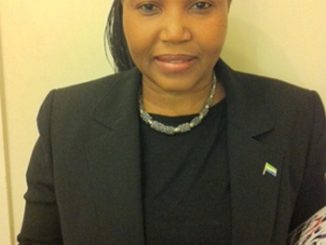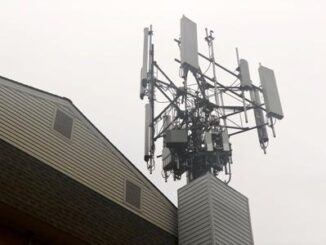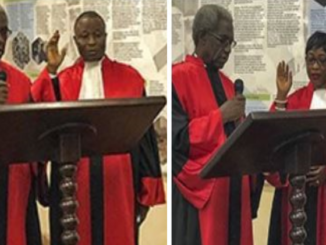
By ABDULAI BAYRAYTAY :
To say that the peoples of the three West African states of Sierra Leone, Guinea and Liberia are undergoing trauma would be an understatement. This is particularly so as these states are presently battling the Ebola Virus Disease (EVD) that was first detected and confirmed in Guinea and then spread to Sierra Leone and Liberia with the attendant deaths of innocent and unsuspecting people.
Indeed, the Ebola Virus Disease (EBV) reported by the World Health Organization (WHO) as one of the deadliest in the history of epidemics, has claimed the lives of a record cumulative fatality of two hundred and fourteen (214) Ebola confirmed deaths, five hundred and ninety-one (591) confirmed Ebola cases and one hundred and sixty-one (161) survivors as of August 5, this year, in the case of Sierra Leone.
So far, Governments have poured millions of dollars with the international community complementing with experts and financial resources to mitigate and eventually eradicate the scourge of Ebola. So far, President Dr. Ernest Bai Koroma and his Government remain the only country that has pronounced the most stringent measures that include the deployment of the military and the police to cordon off the epicentres of the virus and quarantine households of confirmed cases of Ebola.
However, the fight against the EVD continues to be as challenging as ever, with particularly various hypotheses and theories being proffered by some distracting mainstream media and other social commentators that Ebola remains a myth, and that, in the case of sierra Leone, it was all a ploy by the Government to scale down populations in hitherto opposition strongholds with the intention of providing political advantage to the ruling All People’s Congress (APC) party come the 2017/18 elections. The coincidence of a census slated for later this year did not help the situation either.
In neutralising this ill-fated theory, Government had to support all the ten political parties, including the main opposition Sierra Leone People’s Party (SLPP), to visit the south and eastern parts of the country to “sensitize” the public on Ebola. Then, one sort of civil society or the other took the cue and embarked on massive sensitization campaigns against the dreaded disease.
The myth and confusion were no novelty to Sierra Leone. For instance, when Ebola broke out in Uganda in the early 2000s, the myth that the wearing of banana leaves on the left wrist and the appeasement of the gods because of their unhappiness with mother earth would spare one of the scourges dominating communities around Gulu.
The high point of the controversy in the current fight against Ebola in West Africa is the rather hypothetical question repeatedly posed by social media commentators of what bio-war researchers from Western countries are doing in Ebola-prone countries West Africa?
This article is therefore not so much to examine neither the pro-active measures the respective governments have put in place in the fight against EVD nor to scold the ignorant populations about their initial denial that Ebola is a myth.
Instead, it intends to underscore the trauma that families and the countries are dealing with on a daily basis. One can only imagine the grief that comes with bereavement wherein one is denied the cultural right to give a loved one a befitting funeral rite after passing on from the Ebola virus.
In situations like this, there is no gainsaying that Post-traumatic Stress Disorder (PTSD), after an exceptionally stressful event like that of Ebola is prevalent among the people. It is especially traumatising for children who have lost their parents to Ebola and then rejected by their communities amidst the attendant stigmatization.
This is where one calls for child protection issues and therapeutic counselling to be incorporated as part of a holistic approach in whatever strategies devised with Governments and the international community in the fight against Ebola.
Like the trauma that Sierra Leone witnessed during and following the end of the civil war, interventions should not just focus on supporting individuals, families and communities regain a sense of control and safety, but those affected should be taught skills that would make them more equipped in their management of anger and rage, or how to mourn the loss of loved ones.
There is a compelling need for the Ministry of Health and Sanitation to scale up trauma counselling during and after the Ebola outbreak. This is so badly needed because following the death of Sierra Leone’s only virologist and lead-fighter against Ebola, Dr. Sheikh Humarr Khan (from Ebola) a fortnight ago, my volunteer line to provide free trauma counselling continues to be inundated with calls almost round the clock from doctors, nurses and frontline health workers who have one form of anxiety or the other.
And this is where I doff my hat to WHO and the Ministry of Health and Sanitation in Sierra Leone for establishing a 117 hotline that continues to provide not just a medical response to Ebola, but therapeutic counselling to front line health workers, children and their families in ongoing efforts to address the psychological trauma that comes with the Ebola outbreak in the sub-region.
This is crucial since therapy has clinically proven to be very helpful and effective in the treatment of PTSD, as healing will often occur with those directly affected retelling the trauma during and after the disease would have been mitigated and brought under safer controls.




Leave a Reply